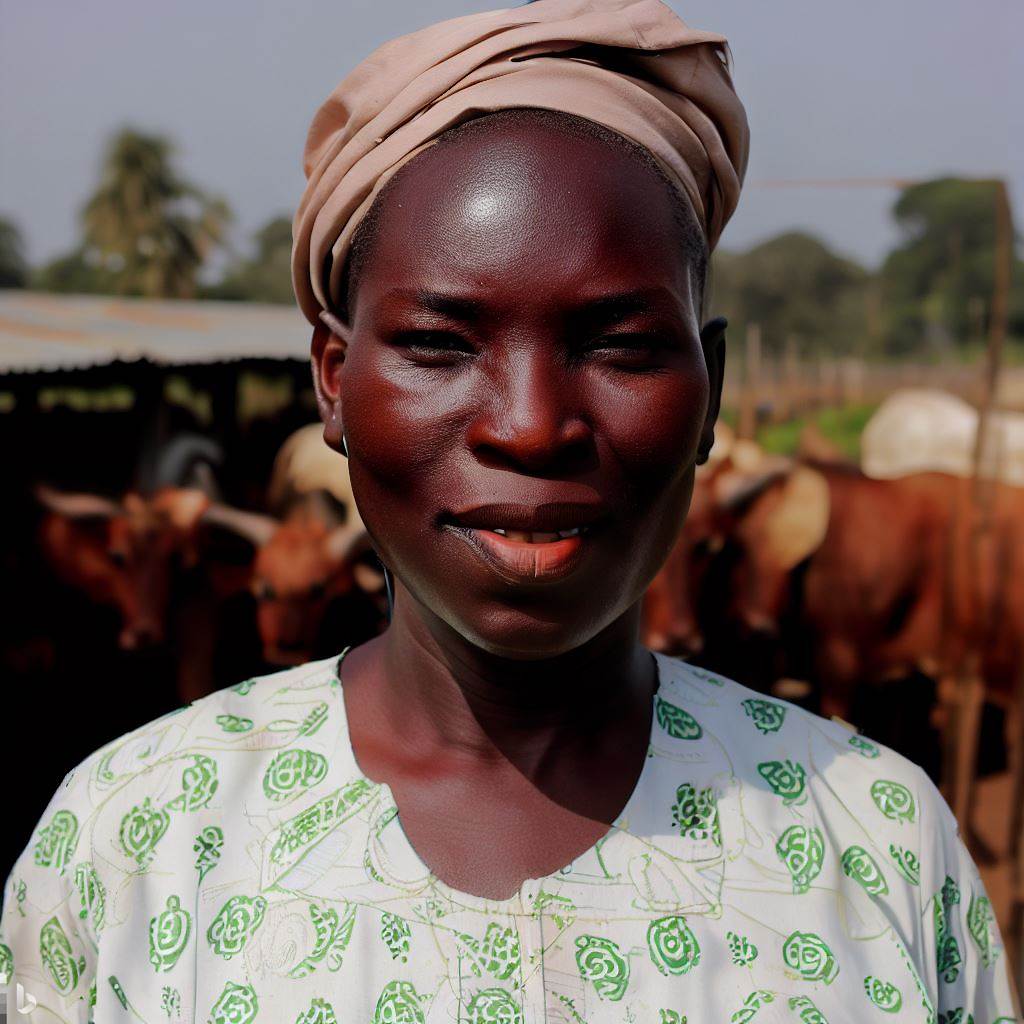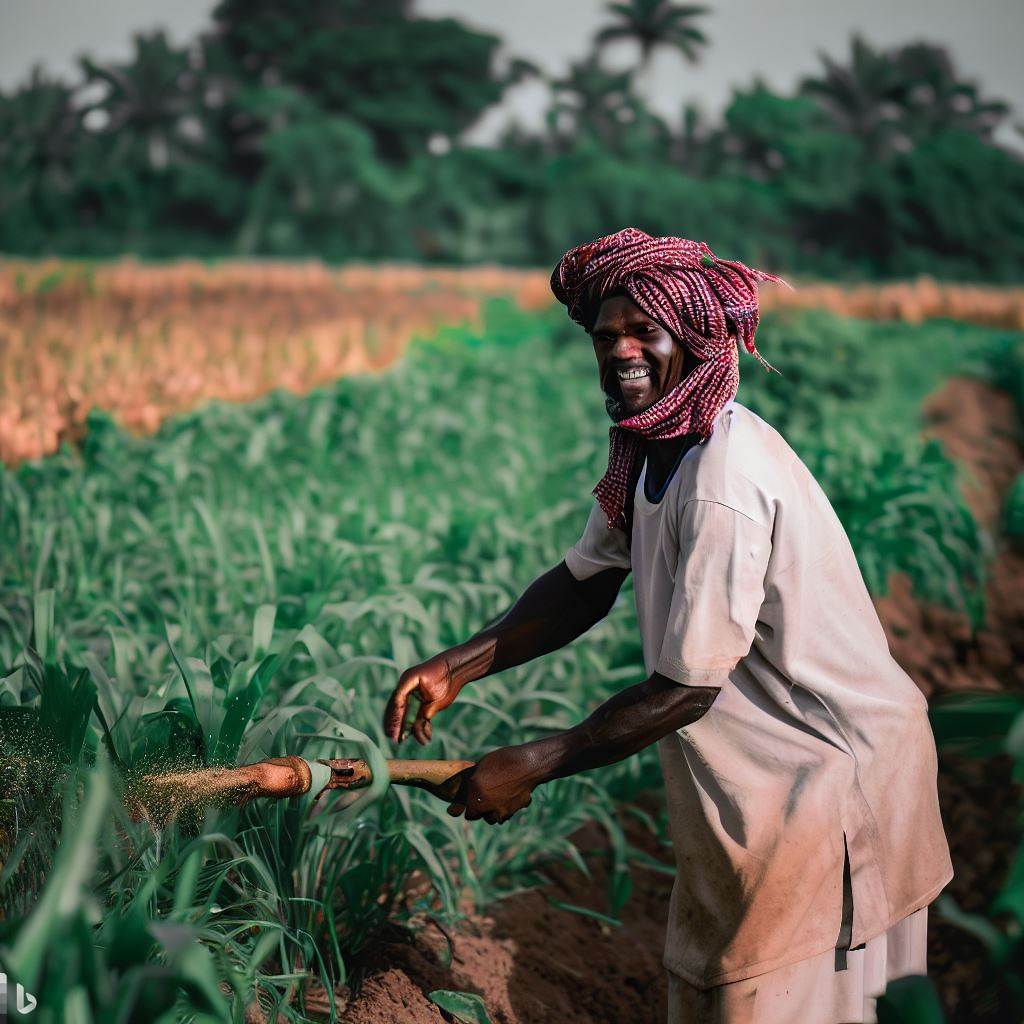Introduction
Sustainable livestock farming is crucial for ensuring long-term food security and environmental sustainability. Nigeria, with its vast agricultural resources, plays a significant role in the global livestock farming industry.
Livestock farming contributes significantly to the Nigerian economy as it provides food, employment, and income for millions of people. It also serves as a source of raw materials for industries such as leather and pharmaceuticals.
However, the challenges facing Nigeria’s livestock farming industry are immense. Inefficient production practices, inadequate infrastructure, and limited access to finance hinder the industry’s growth and sustainability.
To address these challenges, the concept of sustainable livestock farming becomes essential. Sustainable practices involve adopting methods that protect the environment, ensure animal welfare, and promote economic viability.
Implementing sustainable livestock farming practices in Nigeria will yield numerous benefits. Firstly, it will enhance food security by improving productivity and ensuring the availability of nutritious animal products.
This is crucial for meeting the growing demand for livestock products in a rapidly expanding population.
Additionally, sustainable livestock farming can help mitigate climate change by reducing greenhouse gas emissions.
By implementing better waste management systems and adopting renewable energy sources, the industry can become more environmentally friendly.
Moreover, sustainable farming practices will improve the livelihoods of farmers and rural communities. By promoting knowledge sharing, training, and access to credit, farmers can enhance their productivity and income.
Basically, sustainable livestock farming holds tremendous significance for Nigeria and the entire world.
It is imperative to recognize its importance and work towards implementing practices that conserve natural resources, improve animal welfare, and ensure economic prosperity.
By doing so, Nigeria’s livestock farming industry can become a role model for sustainable agricultural practices globally.
Challenges Faced by Nigeria’s Livestock Farming Industry
Lack of proper infrastructure and resources
The livestock farming industry in Nigeria faces significant challenges in terms of infrastructure and resources.
There is a lack of adequate facilities such as barns, milking parlors, and processing plants, which hinders the efficient production and management of livestock.
Additionally, there is a shortage of quality feed, water, and equipment necessary for optimal livestock rearing.
High cost of production
Another challenge faced by Nigeria’s livestock farming industry is the high cost of production. Farmers struggle with expensive inputs, such as animal feeds, veterinary drugs, and equipment.
These costs often exceed the profits earned from selling livestock products, making it difficult for farmers to sustain their businesses and invest in modern farming practices.
Inadequate access to veterinary services
Livestock farmers in Nigeria often struggle with limited access to veterinary services.
Due to the vast landscape and inadequate distribution of veterinary clinics, many farmers are unable to access timely and quality healthcare for their livestock.
This lack of veterinary services leads to increased risks of disease outbreaks, poor animal health, and reduced productivity.
Climate change and its impact on livestock farming
Climate change poses a significant challenge to Nigeria’s livestock farming industry.
Rising temperatures, irregular rainfall patterns, and extreme weather events affect the availability and quality of pastures and water sources.
This, in turn, impacts livestock nutrition and reproduction, leading to decreased productivity and increased vulnerability to diseases.
Inefficient value chain and market access
The livestock value chain in Nigeria is often characterized by inefficiencies and limited market access.
Small-scale farmers struggle with obtaining fair prices for their products due to middlemen and lack of proper market linkages.
Additionally, inadequate infrastructure for cold storage and transportation limits the ability to reach wider markets, resulting in post-harvest losses and reduced profitability.
Limited access to finance and insurance
Livestock farmers in Nigeria face challenges in accessing affordable finance and insurance services.
Many financial institutions have stringent requirements and limited products tailored to the needs of livestock farmers.
This hinders investment in modern farming technologies, expansion of livestock herds, and adoption of risk mitigation strategies, leaving farmers exposed to various uncertainties.
Lack of technical skills and knowledge
The livestock farming industry in Nigeria also suffers from a lack of technical skills and knowledge.
Farmers often lack the necessary training and expertise for improved livestock management practices. This includes knowledge of animal nutrition, breeding techniques, disease prevention, and efficient farm management.
The absence of proper education and training programs inhibits the adoption of sustainable and modern farming practices.
Addressing these challenges is crucial to the development of a sustainable livestock farming industry in Nigeria.
Strategies such as improved infrastructure development, access to affordable credit and insurance, strengthening of veterinary services, better market linkages, and relevant training programs can help overcome these obstacles.
Additionally, policies that promote climate-smart agriculture techniques and research on resilient livestock breeds can mitigate the impacts of climate change.
By implementing these measures, Nigeria’s livestock farming industry can unlock its potential for improved productivity, increased income for farmers, and sustainable development in the sector.
Read: Farm Management: Comparing the Nigerian Approach to Global Practices
Traditional Farming Practices in Nigeria
Description of traditional farming techniques used in Nigeria
Shifting cultivation
Traditional farmers in Nigeria practice shifting cultivation, where land is cleared and cultivated for a few years before being left fallow for regeneration.
Intercropping
Farmers in Nigeria often practice intercropping, where different crops are grown together in the same field, maximizing land utilization and minimizing pest and disease risks.
Crop rotation
Traditional farmers follow crop rotation practices, systematically changing the crop planted to maintain soil fertility and reduce the likelihood of nutrient depletion.
Agroforestry
In Nigeria, agroforestry is a common traditional farming practice that involves integrating trees, crops, and livestock to enhance ecosystem services and provide additional income streams.
Animal husbandry
Traditional livestock farming in Nigeria involves extensive grazing systems, where animals roam freely on communal lands, feeding on natural vegetation.
Emphasis on the need for sustainable alternatives
Environmental degradation
The traditional farming practices in Nigeria have led to soil erosion, deforestation, and biodiversity loss, posing significant threats to the environment.
Soil fertility decline
Continuous cultivation without sustainable practices has resulted in soil erosion, nutrient depletion, and reduced crop yields, threatening food security.
Climate change impacts
Traditional farming practices contribute to greenhouse gas emissions and vulnerability to climate change, highlighting the urgency for sustainable alternatives.
Population growth and food demand
Nigeria’s rapidly growing population necessitates sustainable farming practices to ensure sufficient food production and prevent land degradation.
Sustainable alternatives
Transitioning to sustainable livestock farming methods, such as pasture management, improved animal housing, and efficient feeding, can mitigate environmental risks.
Benefits of sustainable alternatives in Nigeria
- Improved soil health: Sustainable farming techniques like organic fertilizers and cover cropping can enhance soil fertility, promoting long-term agricultural productivity.
- Biodiversity conservation: Implementing sustainable farming practices helps preserve biodiversity, protecting native plant and animal species in Nigeria’s fragile ecosystems.
- Climate resilience: Sustainable livestock farming methods decrease methane emissions, promote carbon sequestration, and increase the resilience of farming systems to climate change.
- Economic opportunities: Adopting sustainable alternatives can create income-generating opportunities through the production of organic crops, value-added products, and eco-tourism.
- Food security: Sustainable farming practices ensure long-term food security by preserving soil fertility, increasing productivity, and reducing reliance on external inputs.
Traditional farming practices in Nigeria have been vital for centuries, but their unsustainability now poses significant challenges.
Transitioning towards sustainable alternatives is crucial to mitigate environmental degradation, address climate change impacts, and ensure food security.
By embracing sustainable livestock farming methods, Nigeria can create a path towards a resilient and environmentally conscious agricultural sector.
Read: Exploring the Role of an Agricultural Operations Manager in Nigeria

Sustainable Livestock Farming Practices in Nigeria
In Nigeria, the introduction of innovative farming methods has proven to be a key factor in promoting sustainable livestock farming.
These methods focus on minimizing environmental impact, enhancing animal welfare, and ensuring long-term economic viability.
Introduction of Innovative Farming Methods in Nigeria
One of the primary goals of sustainable livestock farming in Nigeria is to reduce the carbon footprint associated with animal agriculture. To achieve this, farmers are employing various innovative practices:
- Utilizing renewable energy sources, such as solar power, for farm operations.
- Implementing precision farming techniques to optimize resource use and minimize waste.
- Adopting agroforestry systems that integrate livestock grazing with tree planting to enhance soil fertility and provide shade for animals.
- Investing in biogas digesters that convert animal waste into clean energy and organic fertilizer.
- Integrating aquaculture with livestock farming to utilize nutrient-rich wastewater for fish production while reducing the environmental impact.
These innovative farming methods not only contribute to sustainable livestock production but also provide economic benefits for farmers.
By reducing production costs and enhancing efficiency, farmers can achieve higher profitability while minimizing resource use.
Highlighting the Success Stories of Sustainable Livestock Farmers in Nigeria
Several Nigerian farmers have embraced sustainable livestock farming practices and have achieved remarkable success in their ventures. Their stories serve as inspiration and motivation for others to follow suit:
- Farm A, located in northern Nigeria, has implemented rotational grazing practices to prevent overgrazing and promote pasture regeneration. This has resulted in improved soil health and increased livestock productivity.
- Farm B, in the southwestern region, has adopted a zero-grazing system and utilizes composting techniques to manage animal manure effectively. This approach has led to reduced environmental pollution and improved soil fertility.
- Farm C, situated in the eastern part of the country, has integrated livestock farming with crop production. Through careful nutrient management, they have achieved a sustainable closed-loop system that minimizes external inputs and maximizes productivity.
- Farm D, in the Niger Delta region, has implemented a holistic approach by incorporating permaculture principles into their livestock farming practices. This has resulted in a harmonious coexistence between livestock, crops, and the environment.
These success stories demonstrate that sustainable livestock farming is not only achievable but also beneficial for both the environment and farmers’ livelihoods.
They showcase the potential of innovative farming methods to transform the agricultural sector in Nigeria and pave the way for a more sustainable future.
Basically, sustainable livestock farming practices in Nigeria are evolving with the introduction of innovative methods. These practices aim to minimize environmental impact, enhance animal welfare, and ensure long-term economic viability.
By highlighting the success stories of sustainable livestock farmers, we can inspire others to adopt these practices and contribute to a more sustainable agricultural sector in Nigeria.
Together, we can build a brighter future for both the farming community and the environment.
Read: Trends and Innovations in Farm Management in Nigeria
Delve into the Subject: Nigeria’s Dairy Industry: An Economic Perspective
Government Initiatives and Policies
Nigerian government’s efforts to promote sustainable livestock farming
In Nigeria, the government has been making efforts to promote sustainable livestock farming through various initiatives and policies.
The Nigerian government has recognized the importance of sustainable livestock farming in ensuring food security and economic growth.
National Livestock Transformation Plan (NLTP)
One of the government’s key initiatives is the National Livestock Transformation Plan (NLTP), which aims to transform the livestock sector into a viable and sustainable industry.
The NLTP focuses on promoting ranching as a more sustainable method of livestock production, as opposed to open grazing.
Open grazing has been a major cause of conflicts between herders and farmers, leading to loss of lives and destruction of farmlands.
The government’s push for ranching is aimed at reducing these conflicts and promoting sustainable land use practices.
Under the NLTP, the government plans to establish ranches in different parts of the country, providing infrastructure, training, and veterinary services to farmers and herders.
This initiative is expected to improve the quality of livestock, increase productivity, and boost the income of farmers and herders.
In addition to the NLTP, the government has also implemented policies to regulate the importation of livestock and livestock products.
These policies are aimed at protecting local farmers and promoting the growth of the domestic livestock industry.
National Animal Disease Control Program (NADCP)
Furthermore, the government has introduced programs to improve animal health and disease control in the livestock sector.
One of such programs is the National Animal Disease Control Program (NADCP), which focuses on eradication and control of livestock diseases.
The NADCP provides vaccines, surveillance, and training to farmers to help prevent and manage disease outbreaks.
The government has also partnered with international organizations and development partners to enhance capacity building and knowledge transfer in sustainable livestock farming.
These initiatives and policies by the Nigerian government have started yielding positive results.
There has been an increase in the establishment of ranches, which has led to a decline in conflicts between herders and farmers.
The quality of livestock has also improved, leading to increased productivity and better market opportunities.
Local farmers are now able to compete with imported livestock products, leading to a boost in the domestic livestock industry.
Essentially, the Nigerian government’s initiatives and policies in promoting sustainable livestock farming are crucial towards achieving food security, economic growth, and reducing conflicts between herders and farmers.
Read: How Climate Change Affects Farm Management in Nigeria
Lessons to Learn from Nigeria’s Sustainable Livestock Farming
When it comes to sustainable livestock farming, Nigeria has valuable lessons to offer.
By highlighting the essential takeaways from Nigeria’s practices, other countries and individuals can benefit and ultimately contribute to a greener and more sustainable future.
Embrace Traditional Knowledge and Practices
Recognize the wisdom in traditional livestock farming methods that have been passed down for generations.
Publish Your Professional Profile, Business or Brand
Showcase your expertise, gain trust, and boost visibility instantly on Professions.ng.
Publish NowCombine this knowledge with modern scientific advancements to create sustainable and efficient systems.
Prioritize Indigenous Breeds
Protect and support indigenous livestock breeds that are adapted to local environments.
These breeds often have stronger resistance to local diseases and require fewer resources to thrive.
Promote Integrated Farming Systems
Encourage the integration of crop and livestock farming to increase resource efficiency.
Utilize animal waste as organic fertilizer for crops, reducing the need for chemical fertilizers.
Invest in Research and Development
Allocate resources for research to develop innovative solutions and improve livestock farming practices.
Support research on sustainable feed production, animal health, and waste management.
Strengthen Extension Services
Provide farmers with access to expert advice and training on sustainable livestock farming.
Empower extension services to disseminate knowledge and best practices to farmers across the country.
Foster Public-Private Partnerships
Promote collaborations between the government, private sector, and civil society organizations.
Combine efforts and resources to drive sustainable livestock farming initiatives.
Improve Infrastructure and Access to Markets
Invest in reliable transportation, storage, and processing facilities to reduce post-harvest losses.
Enhance market access for small-scale livestock farmers, allowing them to sell their products at fair prices.
Strengthen Policy and Regulatory Frameworks
Develop and enforce clear policies that promote sustainable practices and regulate livestock farming.
Incentivize farmers to adopt sustainable methods through appropriate regulations, subsidies, and incentives.
Promote Climate-Smart Livestock Farming
Encourage the use of renewable energy sources such as solar power for powering farms and processing units.
Implement water management strategies to conserve resources and reduce pollution.
By embracing these lessons from Nigeria’s sustainable livestock farming, other countries and individuals can make significant progress towards creating a more environmentally friendly and economically viable agricultural sector.
Together, we can build a sustainable future for both livestock and the planet.
Conclusion
Sustainable livestock farming is of utmost importance in ensuring a secure food supply and protecting the environment. Nigeria’s experience provides valuable lessons for other countries.
It is clear that adopting sustainable practices, such as proper waste management and resource conservation, can mitigate the negative impacts of livestock farming.
Furthermore, Nigeria’s success in promoting small-scale farming and empowering local communities should serve as a model for promoting sustainable agriculture worldwide.
By providing training and support to farmers, implementing regulations, and investing in infrastructure, governments can create an enabling environment for sustainable livestock farming.
It is crucial for policymakers, stakeholders, and the public to recognize the benefits of sustainable livestock farming and work together to address its challenges.
In conclusion, sustainable livestock farming is not only a necessity for food security and environmental protection but also an opportunity for economic growth and poverty reduction.
The lessons from Nigeria’s experience highlight the importance of taking a holistic and inclusive approach to sustainable farming practices.
By prioritizing sustainability and embracing innovative solutions, we can ensure a prosperous future for both farmers and the planet.




